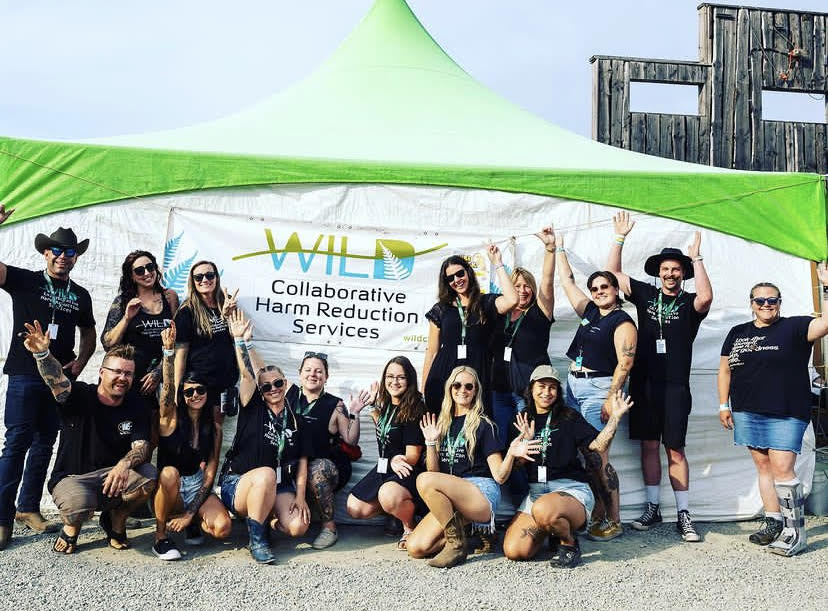As the temperatures rise and the festival season sets in; Island Health has health tips to ensure everyone has a fun, and safe, summer.
Attending events and listening to live music offers many health benefits including a lift in mood, cardiovascular exercise via dancing, and an increased sense of community; but being outdoors for long periods of time, gathered close together with large amounts of people can also pose health risks. The good news is that most risks can be prevented.
Heat & sun
With the expected hotter temperatures this summer, festival goers are encouraged to stay in the shade, use a broad-spectrum sunscreen with SPF 30 or higher, and regularly drink water to stay hydrated. The use of certain illicit substances, like MDMA, can further increase body temperature.
Severe dehydration can send someone into shock. Sports drinks or electrolyte packs can help replace nutrients lost in sweat. One way to tell if you're dehydrated is to check the colour or your urine. If it's dark yellow or brown, that's a sign that you probably need more fluids.
Overheating, when the body gains heat faster than it can cool itself down, can cause several heat-related illnesses. Signs of heat exhaustion include heavy sweating, severe headache, muscle cramps, extreme thirst, and dark urine. Signs of heat stroke include confusion, fainting or decreased consciousness, or high body temperatures that cannot be lowered. Visit the festival’s health service to get help.
Noise
Exposure to loud noise at festivals can cause irreversible hearing loss. Don’t stand too close to the speakers and wear a form of ear protection.
Communicable diseases
Diseases like meningitis and staph infections can be spread through the sharing of drinks, cigarettes and vapes, and lipstick/lip gloss.
Staying up to date with immunizations, like measles and COVID-19, can help to prevent the spread of the most common contagious diseases that thrive in crowds.
Sex positive
Sexually transmitted infections (STI) including syphilis, chlamydia, and gonorrhea are increasing across the region. To reduce the risk of infection, condom use is encouraged. Many festivals offer free condoms at hospitality tents or first aid booths.
Pharmacies also offer free emergency contraception which can help prevent pregnancy after unprotected sex, or failed birth control like if a condom breaks, up to five days after sexual activity.
Everyone who is sexually active should get tested regularly.
Where to get tested:
- Find a clinic
- In Greater Victoria or Duncan, and no symptoms: GetCheckedOnline.com
- Options Telehealth service
- For ages 12-24: Island Health Youth Clinics & Foundry Virtual BC
- Or visit a family doctor, walk-in clinic or sexual health clinic
Consent to sex means partners agree to sexual activity and everyone understands what they’re agreeing to. If someone is sexually assaulted they should go to their nearest hospital emergency room as soon as possible, and connect with VictimLinkBC for information and support by calling or texting 1-800-563-0808 or emailing VictimLinkBC@bc211.ca
Alcohol
Should people choose to drink alcohol, they can take steps to reduce their risk of getting sick or injured. Hit the food trucks or canteen prior to drinking, avoid having alcohol on an empty stomach. Alcohol can cause dehydration, so make every second drink water.
Drink slowly - don't have more than two standard drinks in any three-hour period. Be aware of long-term risks associated with drinking through the latest evidence-based advice in Canada’s Guidance on Alcohol and Health.
Substances
With illicit substances being more poisonous, more unpredictable, and more deadly in this enduring public health toxic drug crisis, it’s more important than ever that people use harm reduction practices so stay safer.
Drug-checking can inform the owner of any unexpected, and possibly harmful or deadly, additives in samples. WILD Collaborative Harm Reduction Association, Canadian Mental Health Association Mid Island, and Substance, will be at local festivals through the summer (see backgrounder for list of events) offering free, non-judgemental drug-checking. Services are also available at health facilities and through the mail.
Use with someone or have someone check on you. Never leave your friend alone to ‘sleep it off.’ If using with friends, stagger use or have a designated sober person.
Go slow – try a little bit and see how things go. Don’t mix multiple drugs. Don’t mix drugs with alcohol.
BACKGROUNDER:
Below is a list of local events in which WILD Collaborative Harm Reduction Association, Canadian Mental Health Association Mid Island, and Substance Drug Checking are offering free drug-checking and other harm reduction services.
Laketown Shakedown
Phllips Tilt
Pachena Bay Music Festival
Sunfest Country
Blackberry Jam
Phillips Reverb
Rifflandia
Cumberland Wild

WILD Collaborative Harm Reduction Association offering drug-checking and other harm reduction services at past festivals.
